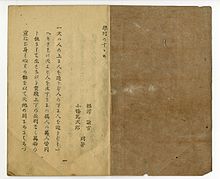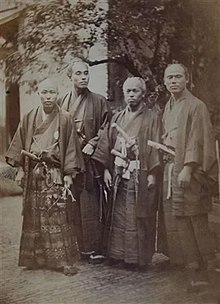Fukuzawa Yukichi

Fukuzawa Yukichi ( Japanese 福 沢 諭 吉 Fukuzawa Yukichi ; born January 10, 1835 in Osaka , † February 3, 1901 in Tokyo ) was a Japanese author, translator and political philosopher. He is considered one of the great intellectuals of the Meiji Restoration , who played a crucial role in the modernization of Japan.
Life
Fukuzawa Yukichi was born in 1835 as the son of an impoverished samurai family serving the ruler of Nakatsu (now in Ōita prefecture ) in Ōsaka . Since the end of the 18th century there has been a strong interest in the so-called Dutch studies ( Rangaku ) in the Princely House of Okudaira . In 1853, shortly after the arrival of the American Commodore Matthew C. Perry , who called for the country to be opened up, Fukuzawa was sent to Nagasaki , where there were good opportunities to study the language, culture and technology of the Dutch in the vicinity of the VOC trading office Dejima . A year later he moved to Osaka to improve his language skills in the famous Tekijuku school of the doctor and Holland Kundler Ogata Kōan . In 1858 he was sent to the Edo residence of the Okudaira Princely House. Here he taught the samurai (i.e. officials) the Dutch language.
The following year Japan opened three ports to foreign ships, and Fukuzawa traveled to Kanagawa to see the foreigners. To his amazement, almost everyone spoke English instead of Dutch, so he began to learn the English language. Since there were hardly any aids at the time, progress was modest.
He was one of the first Japanese to travel to the USA in 1860 and to Europe as a translator and member of a government delegation in 1862. Between 1866 and 1869 he recorded his experiences with the West and his newly acquired knowledge about the West in "Conditions in the West", Seiyō Jijō ( 西洋 事情 ). In these bestsellers, Fukuzawa described on the one hand everyday institutions such as hospitals, train stations, post offices, etc., and on the other hand he added a Japanese translation of " Chambers' Political Economy " , a business textbook that shaped his own ideas very much , to his descriptive remarks . It represents a kind of bridge between his studies in Dutch studies and his first own normative-enlightenment works, which he wrote in the early 1870s, in the first full decade of the Meiji Restoration - and which went hand in hand with many other Enlightenment activities influenced by the West.

He stayed away from political life and from government posts; for this he began from 1868, with the beginning of the Meiji Restoration, to publish his ideas in various newspapers, became a member of one of the first intellectual communities in Japan, the Meirokusha , founded the Keiō Gijuku ( 慶 應 義 塾 ), a private school with a public character, led by the Model of the English public schools . It is said that during the unrest of 1868 he admonished his students to study instead of using the sword to stand up for the new state. He wrote two of his greatest works: “Call to Science”, Gakumon no susume ( 学問 の す ゝ め ), published between 1872 and 1876, and “Outline of a Theory of Civilization”, Bunmeiron no gairyaku ( 文明 論 之 概略 ), from 1875 These two works in particular, but also the other early writings of Fukuzawa, formed the backbone of the Japanese Enlightenment movement in the late 1860s and 1870s. Its contents - Western economics, philosophy and politics - and the other books on liberal Western social theories were conveyed in his school, which in 1890 received the status of a university ( Keiō University ). In the 1880s and 1890s, Fukuzawa himself gradually transformed from a liberal enlightener to a nationalist, perhaps even an ultra-nationalist, and advocated Japan's departure from the rest of Asia. This is expressed in the editorial Datsu-A-Ron ( 脱 亜 論 'Out of Asia' ), published anonymously in 1885 , which is attributed to him. A passage from it was quoted in 1999 by the German weekly newspaper Die Zeit under the heading “Words of the Millennium”. He died in 1901 at the age of 66.
A portrait of Fukuzawa now adorns the Japanese 10,000 yen note, the largest banknote in Japan .

Remarks
- ↑ Unfortunately Fukuzawa decided not to report on the Germany he visited.
- ↑ In fact, instead of two crossed swords, Keiō University has two quills in its coat of arms.
- ↑ Words of the Millennium No. 01/1999. In: Die Zeit Nr 1 1999. Retrieved on July 13, 2018 .
Fonts
- An autobiographical description of life . Translated by Gerhard Linzbichler in collaboration with Hidenao Arai u. a. Tokyo: Keio Gijuku University, 1971.
- Clothing, food and living in the west . Translated by Yvonne Guckelsberger. Berlin: Mori-Ôgai Memorial of the Humboldt University in Berlin, 2008.
swell
- Carmen Blacker: The Japanese Enlightment. A study of the writings of Fukuzawa Yukichi . Cambridge 1964.
- Albert M. Craig: Fukuzawa Yukichi. The Philosophical Foundations of Meiji Nationalism . In: Robert Edward Ward (ed.): Political Development in Modern Japan . Princeton, New Jersey 1968, pp. 99-148.
- Norio Tamaki: Yukichi Fukuzawa, 1835-1901. The Spirit of Enterprise in Modern Japan . Basingstoke, Hampshire [u. a.] 2001.
literature
- Shunsaku Nishikawa: Fukuzawa Yukichi . In: UNESCO: International Bureau of Education (Ed.): Prospects: the quarterly review of comparative education . Vol. XXIII, No. 3/4 , 1993, p. 493-506 ( unesco.org [PDF]).
- Wolfgang Michel, Torii Yumiko, Kawashima Mabito: Kyûshû no rangaku - ekkyô to kôryû ( ヴ ォ ル フ ガ ン グ ・ ミ ヒ ェ ル ・ 鳥 井 裕美子 ・ 川 嶌 眞 人 共 編 『九州 の』 蘭 と学 ー 越境 Crossing the border - customer crossing in Kyush and と学 ー 越境 . Shibunkaku Shuppan, Kyôto, 2009. ISBN 978-4-7842-1410-5
Web links
- Literature by and about Fukuzawa Yukichi in the catalog of the German National Library
- Gakumon no susume (Japanese text, edition 1-17)
| personal data | |
|---|---|
| SURNAME | Fukuzawa, Yukichi |
| ALTERNATIVE NAMES | 福 沢 諭 吉 (Japanese) |
| BRIEF DESCRIPTION | Japanese scholar |
| DATE OF BIRTH | January 10, 1835 |
| PLACE OF BIRTH | Osaka |
| DATE OF DEATH | February 3, 1901 |
| Place of death | Tokyo |



